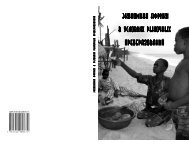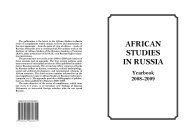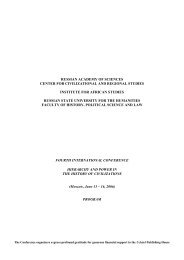L. Fituni, I. Abramova Resource Potential of Africa and Russia's ...
L. Fituni, I. Abramova Resource Potential of Africa and Russia's ...
L. Fituni, I. Abramova Resource Potential of Africa and Russia's ...
Create successful ePaper yourself
Turn your PDF publications into a flip-book with our unique Google optimized e-Paper software.
copra, spices, other products <strong>of</strong> tropical agriculture, natural rubber<br />
<strong>and</strong> some ores <strong>and</strong> fuels took place even before the war. However, it<br />
is very difficult to establish the volume <strong>of</strong> such trade, since all <strong>of</strong> it<br />
was effectuated by European colonial companies <strong>and</strong> the imported<br />
goods were usually registered as originating from UK, France, Belgium,<br />
<strong>and</strong> more rarely, from Italy.<br />
As to the Soviet pre-war exports, only unsystematic records <strong>of</strong><br />
occasional grain deliveries to Egypt, Algeria <strong>and</strong> Tunis are available.<br />
After the Second World War the Soviet Union signed its first<br />
agreements on economic <strong>and</strong> technical cooperation with the countries<br />
<strong>of</strong> the <strong>Africa</strong>n continent: Egypt (1958), Guinea (1959) <strong>and</strong><br />
Ethiopia (1959). Those were later followed by similar documents<br />
with the majority <strong>of</strong> newly independent <strong>Africa</strong>n countries.<br />
By the year 1989 (the de facto end the Soviet visibility in <strong>Africa</strong>)<br />
such agreements have been signed with 36 <strong>Africa</strong>n countries,<br />
including Algeria, Angola, Benin, Burkina Faso, Burundi, Cameroon,<br />
Republic <strong>of</strong> Cape Verde, the Central <strong>Africa</strong>n Republic, Chad,<br />
the People's Republic <strong>of</strong> the Congo (Brazzaville), Egypt, Equatorial<br />
Guinea, Ethiopia, Gabon, Ghana, Guinea-Bissau, Kenya, Libya,<br />
Madagascar, Mali, Mauritania, Mozambique, Morocco, Nigeria,<br />
Niger, Rw<strong>and</strong>a, Sao Tome <strong>and</strong> Principe, Senegal, Somalia, Sudan,<br />
Tanzania, Togo, Tunisia, Ug<strong>and</strong>a, Zambia, Zimbabwe. 1 Those<br />
agreements played an important role in stimulating mutual economic<br />
exchanges <strong>and</strong> in <strong>Africa</strong>’s efforts to transform the colonial structure<br />
<strong>of</strong> its economy.<br />
Though today both in Russia <strong>and</strong> abroad much is written about<br />
the “ideological nature” <strong>of</strong> that co-operation, in our view any honest<br />
<strong>and</strong> competent researcher, would have to acknowledge, that by the<br />
1980s the promotion <strong>of</strong> Marxist-Leninist ideas, played a secondary,<br />
if not even a less important role in USSR’s relations with <strong>Africa</strong>. In<br />
any case, that component <strong>of</strong> the Soviet foreign policy was gradually<br />
losing its importance for the Kremlin.<br />
Already during the Khrushchev period <strong>and</strong> further on till the<br />
fall <strong>of</strong> the Communist regime in the USSR, the fundamental motives<br />
for cooperation with <strong>Africa</strong>n countries were: geopolitical,<br />
133







